Resources to get you started
Launching a writing life happens one step at a time
At the end of every retreat, conference, or class, I always want to give writers concrete suggestions on how to keep the momentum going, how to carve out a writing life, and how to tap into networks of support. This post builds on a handout I have developed for those last days of great work together. Please send me your ideas and additions.
Reading
Want to know my thoughts about launching a writing career? This blog post points you to some helpful resources: http://sinandsyntax.com/my-thoughts-on-breaking-in
A good book on freelancing is The ASJA Guide to Freelance Writing (St. Martin’s Griffin, 2003), put together by members of the American Society of Journalists and Authors. The blurb on the cover says it contains “the trade secrets and industry practices every freelance writer needs to know.”
Classes
You can always, always improve your craft. Classes are available at all levels of writing. Many colleges and universities offer MFA programs or masters in journalism or communications. (Bennington, Goucher, Iowa, and Warren Wilson, for starters.) Want something less intensive? Look into continuing education programs like these:
Many local literary organizations and writing schools offer classes in everything from flash fiction to grant writing and yoga for writers:
 GrubStreet in Boston
GrubStreet in Boston Left Margin LIT in Berkeley, CA
Left Margin LIT in Berkeley, CA Tin House Summer Writers Workshop in Portland, OR
Tin House Summer Writers Workshop in Portland, OR  The Kenyon Review Writers Workshop in Gambier, OH
The Kenyon Review Writers Workshop in Gambier, OH Sewanee in Sewanee, TN
Sewanee in Sewanee, TN New York State Summer Writers Institute in Saratoga Springs, NY
New York State Summer Writers Institute in Saratoga Springs, NY Windward Writing Retreat (O‘ahu) meet & write in the company of other writers
Windward Writing Retreat (O‘ahu) meet & write in the company of other writers
Bookstores and Bookstore events:
A great way to find out more about the literary life and to support other writers and meet our greatest supporters—readers—is to attend book events at independent bookstores. The best booksellers are incredible resources for writers, too. Almost every large town has an independent bookstore (a much more valuable one-stop-shop place than the chains), but here are some with national reputations:
 The Book Passage in Corte Madera, CA
The Book Passage in Corte Madera, CA Books Inc. in San Francisco & Berkeley, CA
Books Inc. in San Francisco & Berkeley, CA Copperfields in Marin and Sonoma, CA
Copperfields in Marin and Sonoma, CA The Tattered Cover in Denver
The Tattered Cover in Denver The Strand Bookstore in NYC
The Strand Bookstore in NYC McNally Jackson in NYC
McNally Jackson in NYC  Powell’s Books in Portland, OR
Powell’s Books in Portland, OR  The Elliott Bay Book Company in Seattle
The Elliott Bay Book Company in Seattle City Lights in San Francisco, CA
City Lights in San Francisco, CA The Last Bookstore in Los Angeles, CA
The Last Bookstore in Los Angeles, CA BookPeople in Austin, TX
BookPeople in Austin, TX Blue Bicycle Books in Charleston, SC
Blue Bicycle Books in Charleston, SC Semicolon Bookstore in Chicago, IL
Semicolon Bookstore in Chicago, IL Parnassus Books in Nashville, TN
Parnassus Books in Nashville, TN
 ALA Conference
ALA Conference AWP (15,000 attendees)
AWP (15,000 attendees) American Society of Journalists and Authors (
American Society of Journalists and Authors ( ASJA) in New York
ASJA) in New York  BlogHer Creators Summit
BlogHer Creators Summit Midwest Writers Workshop
Midwest Writers Workshop Romance Writers of America Annual Conference
Romance Writers of America Annual Conference San Francisco Writers Conference
San Francisco Writers Conference Santa Barbara Writers Conference
Santa Barbara Writers Conference SelfPubCon
SelfPubCon SleuthFest
SleuthFest ThrillerFest
ThrillerFest Travel Writers and Photographers Conference at Book Passage
Travel Writers and Photographers Conference at Book Passage Winter Poetry & Prose Getaway
Winter Poetry & Prose Getaway Willamette Writers Conference
Willamette Writers Conference Writer’s Digest conferences (available online!)
Writer’s Digest conferences (available online!) Writing Heights Writers Conference
Writing Heights Writers Conference
 SF Writers Grotto,
SF Writers Grotto,  The Ruby,
The Ruby,  Writers With Drinks,
Writers With Drinks,  NYC Writers Circle (local)
NYC Writers Circle (local) Windward Writers Retreat, O‘ahu
Windward Writers Retreat, O‘ahu Left Coast Writers,
Left Coast Writers,  California Writers Club,
California Writers Club,  PNW,
PNW,  FSW (regional)
FSW (regional) PEN,
PEN,  ASJA,
ASJA,  MediaBistro (national)
MediaBistro (national) Writer’s Relief (paid service helping writers position and publish work)
Writer’s Relief (paid service helping writers position and publish work)
Events and gatherings Book readings, literary salons, and literary festival events are great places to get inspired, or to meet other members of the writing tribe. Here’s a short (really!) list:
 LA Times Festival of Books
LA Times Festival of Books Bay Area Book Festival
Bay Area Book Festival LitQuake
LitQuake Porchlight Storytelling
Porchlight Storytelling Quiet Lightning
Quiet Lightning Odd Salon
Odd Salon Bazaar Writers Salon
Bazaar Writers Salon Marin Poetry Center
Marin Poetry Center Voz sin Tinta
Voz sin Tinta O, Miami Poetry Festival
O, Miami Poetry Festival Split This Rock Poetry Festival
Split This Rock Poetry Festival Bronx Book Festival
Bronx Book Festival NYC Poetry Festival
NYC Poetry Festival Southern Festival of Books
Southern Festival of Books Festival of Women Writers
Festival of Women Writers Boston Book Festival
Boston Book Festival Las Vegas Book Festival
Las Vegas Book Festival Books by the Banks
Books by the Banks Texas Book Festival
Texas Book Festival Brooklyn Book Festival
Brooklyn Book Festival Baltimore Book Festival
Baltimore Book Festival Portland Book Festival
Portland Book Festival Miami Book Fair
Miami Book Fair Rancho Mirage Writers Festival
Rancho Mirage Writers Festival PEN World Voices Festival
PEN World Voices Festival Savannah Book Festival
Savannah Book Festival Amelia Island Book Festival
Amelia Island Book Festival Dahlonega Literary Festival
Dahlonega Literary Festival Tucson Festival of Books
Tucson Festival of Books Tennessee Williams & New Orleans Literary Festival
Tennessee Williams & New Orleans Literary Festival Massachusetts Poetry Festival
Massachusetts Poetry Festival Get Lit! Festival
Get Lit! Festival Southern Kentucky Book Fest
Southern Kentucky Book Fest Nantucket Book Festival
Nantucket Book Festival Dodge Poetry Festival
Dodge Poetry Festival
All these lists are intended to be suggestive rather than all-inclusive. Start building your own resources, and send me your best finds.
—Constance Hale
| |
Share This:




